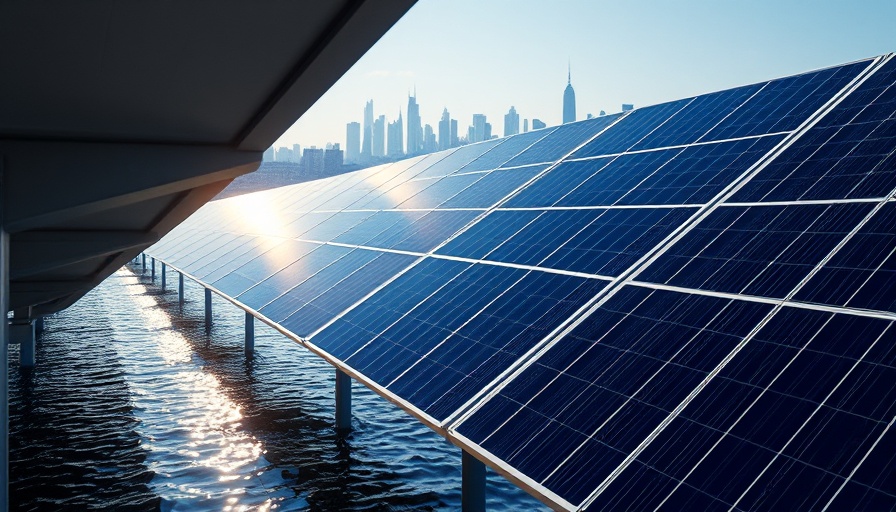
China’s Green Revolution: A New Era in Clean Tech
For decades, China has been branded as a culprit in the global climate change debate. Phrases like "China isn’t doing its part" have long been used as excuses for inaction on environmental policies across the globe. Yet, recent assessments reveal that this narrative is outdated. In fact, over the last 15 years, China has quietly but significantly advanced its clean technology initiatives, leading to a turning point in its energy strategy that promises to reshape global climate commitments.
The Concept of 'Ecological Civilization'
Incorporating a vision deeply rooted in sustainability, China publicly embraced the idea of an ‘ecological civilization’ in 2017, underlining the country’s commitment to harmonizing industrial growth with environmental preservation. This ambition has been woven into the fabric of governance, indicated by its enshrinement in the constitution.
China’s focus on ecological civilization not only champions renewable energy but also sets a broader agenda for a world grappling with dwindling resources. Xi Jinping’s articulation of this new model signifies a paradigm shift, reflecting China's intent to transform the narrative from mere economic growth to a more responsible and sustainable future.
A Global Leader in Renewable Energy
Shifting gears from reliance on fossil fuels, China now spearheads the global market for solar and wind technology. Recent reports from Ember indicate that the total investment in clean energy has been astounding, with Chinese enterprises accounting for nearly one-third of the global expenditures in this sector.
This monumental shift is not just beneficial for China; it actively lowers costs globally, facilitating greener transitions worldwide. As manufacturing scales up, China’s battery technologies, electric vehicles, and hydrogen production methods are trickling down benefits to other countries, ensuring that sustainable initiatives can be more easily adopted elsewhere.
Challenges of Rapid Demand and Urbanization
Despite these advancements, the road to a cleaner future presents its challenges. Unlike more developed nations, where energy consumption has plateaued, China's industrial appetite continues to surge. The labor and energy-intensive processes that have lifted millions out of poverty are the very reasons emissions have not seen a corresponding decline.
Reports show that while emissions from coal power have plateaued, the overall consumption of fossil fuels remains high due to increasing demands from industry and residential consumption. Understanding this duality is key for global leaders who must navigate the complexities of growth and sustainability.
The Economic Impact of Clean Energy
China's foray into green technologies has proven to be an economic boon. The transition is creating jobs, increasing exports, and reducing dependency on imported fossil fuels. This is more than a case study in sustainability; it’s evidence that clean energy can drive economic vitality, challenging the narrative that sustainability equates to sacrifice.
This is a crucial lesson for developed nations, which often frame climate initiatives as cost burdens. Instead, they should look to China as a model that highlights the marriage of economic growth and environmental stewardship, turning the perceived burden into a lucrative opportunity.
Future Trajectories for Global Emissions
Looking ahead, numerous experts posit that if China continues on its current path, we might witness a gradual decline in emissions. As clean energy increasingly displaces fossil fuels, the tipping point could lead to a significant global emissions decline. The challenge will be managing transitions responsibly, ensuring that economic growth does not come at the expense of ecological degradation.
As countries around the world observe China's progress, there's a growing call to drop the dismissive rhetoric and recognize the potential for scaled impact through collaboration and innovation.
Beyond Clean Tech: A Lifestyle Change
Climate advocacy is no longer solely about conservation; it’s about rethinking consumption patterns across the board. The reluctance to adapt our current lifestyles can impede efforts towards sustainability. By observing China's technological advancements and embracing a future that prioritizes green solutions, individuals and nations alike can strive to shift their consumption habits toward more sustainable practices.
In conclusion, while China’s role in climate action can garner criticism, it is undeniable that its advancements in clean technology present significant opportunities for global cooperation and mitigation of climate change. The challenge now lies in turning this insight into action—challenging our assumptions and engaging with the opportunities for a cleaner, more sustainable future.
As we navigate this turning point, now is the time to become proactive in sustainability efforts, whether through personal consumer choices or supporting policies in our communities that promote green technologies.
 Add Row
Add Row  Add
Add 




Write A Comment